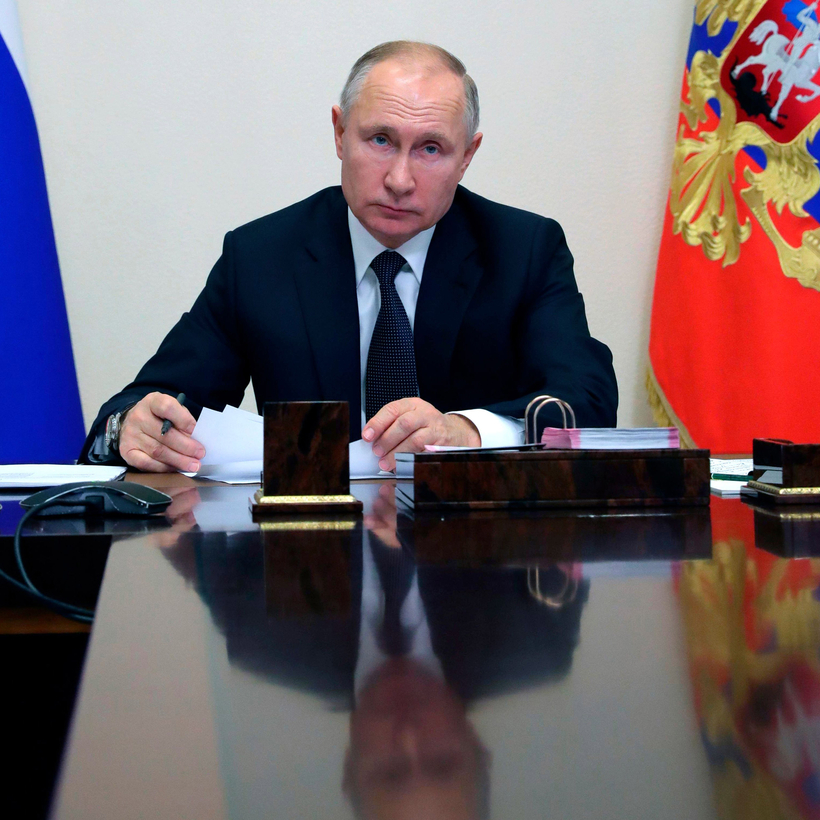Sitting in front of a twinkling digital map of Russia, Vladimir Putin tried to laugh off an awkward question about a flurry of investigations into the business dealings of his nearest and dearest. “They are impossible to read,” he said, during his recent annual news conference. “I flicked through, since this seems to concern me, but everything is piled together and I didn’t get to the end.”
Unlike their president, many Russians were captivated by the reports. Emerging in the space of just a fortnight, the three investigations focused on what critics say is the nepotism and corruption at the heart of Putin’s 21-year rule. The first, by The Insider, an independent Web site, reported that Alina Kabaeva, an Olympic gymnastics champion who is said to be Putin’s lover, had been paid an annual salary of $10 million after being appointed to head a pro-Kremlin media group, despite having no relevant experience.
Another investigation, by the Proekt Web site, identified a former cleaner named Svetlana Krivonogikh who was reported to have given birth to Putin’s illegitimate daughter, Yelizaveta, in 2003. Krivonogikh went from living in a dingy room in a shared apartment to ownership of a luxury ski resort near St Petersburg and a lucrative stake in the Kremlin-friendly Bank Rossiya.
The three investigations focused on what critics say is the nepotism and corruption at the heart of Putin’s 21-year rule.
The third, by iStories, another group of investigative reporters, revealed that Kirill Shamalov, Putin’s former son-in-law, had been allowed to buy shares worth $380 million in Sibur, Russia’s biggest petrochemicals company, for just $100.
The investigations shattered long-established taboos on reporting on the lives of Putin, 68, and his family. For years the former KGB officer has been able to close or neutralize any Russian media outlet that displeases him.

But independent Russian journalists are fighting back. Despite the obvious dangers, about half a dozen Web sites are transforming their country’s media landscape with impressive investigative journalism.
The Web sites operate without large newsrooms, or even permanent offices, and are funded by public donations and grants from foreign organizations that support investigative journalism, rather than Russian investors vulnerable to pressure from the FSB security service.
About half a dozen Web sites are transforming their country’s media landscape with impressive investigative journalism.
“Insider was set up to operate in a very toxic Russian environment,” said Roman Dobrokhotov, the Web site’s editor-in-chief. “We meet once a week at a co-working space and once we’ve left, we leave no traces. We don’t have an office that the FSB can confiscate computers from. Or an investor that the FSB can just come and tell: ‘You can’t write about those things.’ To thrive and survive in Russia, media outlets need to be small and very mobile.”
The Insider often works with Bellingcat, the British-based investigative journalism Web site that exposed the Russian agents blamed for the 2018 Salisbury poisonings. It also helped expose the agents believed to have been behind an attempt to kill the Kremlin critic Alexei Navalny in August. Yet Dobrokhotov, 37, is remarkably calm about the possibility of retribution. “Even if the authorities manage to close down Insider, there is almost no way they can shut down all of these new media outlets at once,” he said. Closure is not the worst that could happen, however: dozens of journalists have been killed or assaulted across Russia since Putin came to power two decades ago.
This new wave of Web sites has been described as “guerrilla” media, but Roman Badanin, founder of Proekt, likes to think of them as a high-tech version of the Soviet dissidents who got around communist-era censorship by distributing illicit copies of banned literature. “The times are different, but the principle is the same now — we work as clandestine media,” he said.
Dozens of journalists have been killed or assaulted across Russia since Putin came to power two decades ago.
Roman Anin, the 33-year-old editor-in-chief of iStories, said: “The authorities have no understanding of the role of journalists. They think that they are their servants and that they can tell them when to bark and when to stay silent. That’s how national media behaves and they simply don’t understand when journalists act differently.”
They may appear to be fearless, but Russia’s investigative journalists are clear-eyed about the risks involved in continuing to embarrass Putin.
“Am I aware that they are trying to get to us? Yes,” said Badanin. “Am I nervous? I am.”
Marc Bennetts is the author of I’m Going to Ruin Their Lives: Inside Putin’s War on Russia’s Opposition

